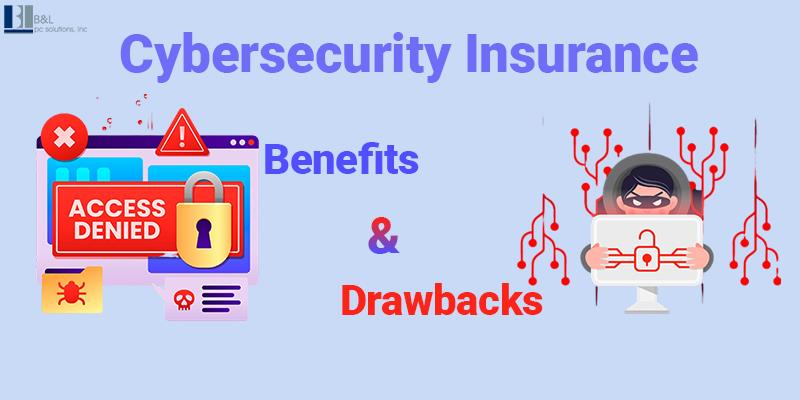
Assuring cyber safety is the highest emphasis for every business today. Technology has occupied every sphere of life, and cyber liability insurance has become imperative for management. This blog will analyze the advantages and disadvantages of cybersecurity insurance a cybersecurity consultant provides.
Why is Cybersecurity Insurance Important?
Cyber vulnerabilities keep growing, implying that the business would benefit significantly from cyber insurance. Ransomware, phishing, and data breaches, which have been risky to most, are no longer alien to any organization. It means that every business organization with a prime goal of success in its operations, irrespective of its size and the type of industry it is in, must overcome this one. However, one should ensure the policy is well understood to cover the business's principal risks.
5 Benefits and Drawbacks of Cybersecurity Insurance
| Benefits | Drawbacks |
|---|---|
| Financial Protection: Pays for the loss due to cyber incidents such as data breaches and ransomware attacks and handles legal fees and recovery costs. | Costly Premiums: Premiums can be expensive, depending on industry, company size, and the frequency of cyberattacks. |
| Risk Management: Helps businesses resolve cyber threats quickly, minimizing long-term impacts. | Policy Restrictions: Some policies may exclude coverage for internal threats or outdated infrastructure. |
| Business Continuity: Ensures continuity by covering extra costs like lost revenue and operational revival after an incident. | High Exclusions: Cybersecurity insurance policies often have many exclusions, which can be challenging to manage. |
| Compliance Support: Offers assistance with industry regulations like HIPAA or GDPR, helping businesses stay compliant. | Complex Claims Process: Filing and validating claims can involve lengthy procedures and complex protocols, delaying resolution. |
| Reputation Management: Covers the cost of public relations services to mitigate brand damage after a cyber incident. | Coverage Gaps: Ambiguous policy wording or ineffective risk evaluation can leave businesses with insufficient coverage. |
In What Ways does Cybersecurity Insurance Aid?
Cybersecurity insurance benefits companies that cybercriminals have targeted. It offers financial aid and clear guidelines for handling situations in crisis. Let's break down how it can help:
1. Some Basic Protection and Coverage of Legal Expenses
A data breach or cyber attack may result in enormous costs within weeks in the form of legal expenses, penalties, customer compensation, etc. Some risks involve transferring the cost of risk to customers, while cybersecurity insurance can mitigate others to safeguard your business from significant harm.
Additionally, some policies offer reimbursement for regulatory penalties caused by non-adherence to set best practices, particularly in health and financial services.
Need help deciding what kind of insurance to get that suits you? For more information on cybersecurity services Long Island and other IT support services, contact B&L PC Solutions today!
2. Supporting Business Continuity in Its Operations
Data breaches result in considerable productivity losses and sales losses due to disruption of online services. Some of the standard offerings covered in cybersecurity insurance policies are costs arising from the downtime of the business's operations, which entails lost revenue, costs of the restoration process, and business interruption costs. This way, your business is protected against any attacks; if one occurs, it should not significantly impact finances.
3. Cybersecurity Insurance coverage and protection
Cybersecurity insurance is about coverage and protects an organization. Many cybersecurity consultants Long Island provide their clients with IT security incident response and legal and public relations services. These services offer a more efficient method of handling a cyber event and reduce business disruption.
4. Greater Customer Confidence and Company Image Management
It has been proven that a well-managed crisis significantly affects customer trust. Cyber insurance includes public relations coverage to handle a breach's outcome. It involves informing customers, controlling the media, and especially tackling damage control for the organization.
5. Regulatory Standards
For organizations with strict legal requirements, including healthcare or financial industries, a lack of compliance with cybersecurity guidelines means paying contractors intensely. A cybersecurity insurance policy provides your company with the necessary resources for cash and other assets to remain timely with updated compliance regulations such as HIPAA or GDPR.
Read More: 8 Cybersecurity Tips For Your Next Summer Travel!
Is It Right for You?
Whether you are a small or large business, receiving threats, or at least suspecting them, is unpleasant. Investing in cybersecurity insurance is highly advisable if your business deals with customer data, company data regarding finance, or valuable information. It benefits the healthcare, finance, and retail industries since they are inclined to become victims of cyber crimes. Small businesses are not exempt, though, and it presents many challenges; many companies will agree that it is worth the investment to at least have an insurance policy in place.
Additional factors must be evaluated before reaching any conclusion. This way, you can give yourself the power of the existing data, allowing you to decide about cyber insurance.
-
Risk Level: Assess your business niche and the kind of data that you work with. Do you fall in the high-risk category of cyber threats?
-
Existing Security Measures: Some security measures already in place in your firm include firewalls, encryption, and employee Cybersecurity training.
-
Policy Costs and Coverage: Check various policies and providers to identify those who will best meet your needs reasonably.
If you're seeking a specific cyber security consultant on Long Island? Call B&L PC Solutions now for a free quote.
Conclusion
Cybersecurity insurance is crucial for any business, regardless of size and type, as it provides compensation, assists in business continuity, provides resources for handling and containing a cyber attack, and helps with compliance. Even with its disadvantages, some of which may include pricey premiums and many policy types, it is always important to consider your level of risk and what is being provided to you and, more importantly, make sure that your business correlates with the policy and decision being made.
Buy cybersecurity insurance today to protect yourself. Contact B&L PC Solutions for information on how we can safeguard your business from cybersecurity risks.
FAQs
1. What is cybersecurity insurance, and why do I need it?
Cybersecurity insurance aims to cover losses organizations are likely to incur due to cyber threats, IT breaches, and cybercriminal activities. They include legal expenses, customer redress, and revenue losses occasioned by disrupted business operations to protect your enterprise today.
2. What does cybersecurity insurance usually include?
It is important to note that most cybersecurity insurance policies cover legal bills, regulatory penalties, lost revenues from operations disruption, costs to recover data, and, where necessary, repudiation after an attack. Contact a cybersecurity consultant for more details.
3. How important is it for my small-scale business to obtain cybersecurity insurance?
Indeed, small businesses are not immune to cyber threats like big businesses. Cybersecurity insurance is worth covering for your small business, given that it can mitigate financial loss should a cyber incident occur.
4. What is the process of selecting the correct cybersecurity insurance policy?
To select the appropriate policy, determine your company’s risk tolerance, evaluate current protective structures, and analyze policy premiums and limits. Then, seek the help of a cyber security service expert, such as B&L PC Solutions, to select the right one for you.
Tags: Benefits and Drawbacks of Cybersecurity Insurance, Cyber Security Consultant Long Island, Cyber Security Services Long Island, Cybersecurity Insurance





